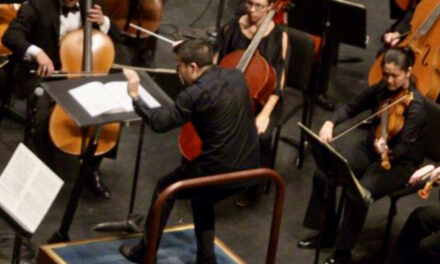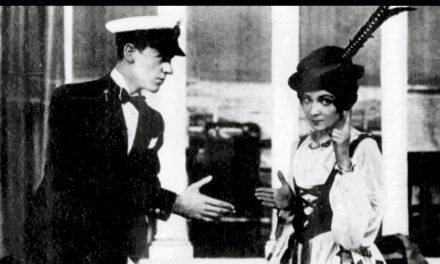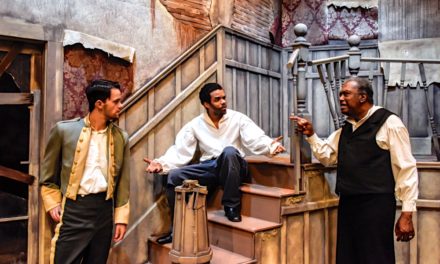“All right, you’re a stand-up comedian, can you write us a script?” That’s not fair. That’s like if I worked hard to become a cook, and I’m a really good cook, they’d say, “OK, you’re a cook. Can you farm?” — Mitch Hedberg (stand-up comedian, 1968-2005)
Editor’s Note: Please excuse the lack of diacritical marks in Vietnamese words.
By Kelly Oristano
Oregon Contemporary Theatre closes its 2022-2023 season with the rolling world premiere of Dustin H. Chinn’s hilarious and smart new play, Colonialism is Terrible, but Phõ is Delicious. Directed by Oánh Nguyėn with an assist from dramaturg Natalia Duong, Colonialism/Phō explores the semipermeable membrane of Vietnamese cuisine, and by extension the history of a people that has long been defined, at least in part, by the complicated relationship with first French and later American colonizers.
The 80-minute run time comprises three long scenes set in three different eras, with the cast of four inhabiting different characters in each, but having a similar spirit and resonance across time. It’s a bit like Cloud Atlas, though with no intercutting of the three tales.
Scene 1: 1899
The first scene is set in 1899, in “French Indochine,” where we meet Madame Gagnier, a wealthy colonist, matron of a large estate, and her Cordon Bleu-trained chef Guillaume, who’s been tasked with making Madame the most French food he can accomplish in this new environment.
Guillame needs help in the kitchen, and Madame’s local valet, Nguyên, recommends the best cook in his village, a woman named Thúy. Guillame shows Thúy how to make a French dish called pot-au-feu. Thúy plays along with the rather simple recipe, but toward the end of the prep, she decides the dish needs a little something, she adds in some fish sauce from her own stash, and phơ is born. One common theory of the origin of phơ holds that it was related to the French colonization, because beef and a couple of the other ingredients came with those colonists.
Scene 2: 1999
The second scene flings us forward to 1999 Ho Chi Minh City, newly opening itself to western tourism. A young Vietnamese capitalist, Quang, brings two American culinary thrill-seekers to his sister Mùi’s phơ cart. The westerners are lumbering idiots, who in trying to be culturally sensitive end up putting their foot in it as often and as hilariously as possible. At one point they apologize for the Vietnam War. Mùi feels dirty taking their money and wonders if financial success is even a justifiable hope if it’s going to come on the back of having to cater to these lunkheads, even as the lunkheads are using wet wipes to clean their chairs and table and then photographing the food before eating. (Honestly, Múi says, who takes pictures of food!) When it is revealed that the westerners have an ulterior motive, Mùi feels justified in her xenophobia.
Scene 3: Now
The last scene is set in Brooklyn in the present day. Julie, a food critic, has brought her Viet friend Danielle to a fancy, $45 per bowl phơ spot. Sam, the manager/server is Vietnamese, but Chris, the chef, is a white guy. He traveled to Vietnam and spent years studying phơ in the north and south of the country, but Chris is charging 45 bucks for what Mùi dished up for a buck fifty, and there’s no sauces or “fixins.” When Danielle asks for sauce and Sam and Chris tell her that’s not going to be possible, all the simmering tension comes to a comedic boil. Danielle makes a scene in the restaurant that we’d all post to instagram had we been there in person. At one point she demands “sauce or reparations!”
While the title makes clear that it’s a play about food, politics, and the reciprocal impacts of one culture on another, Colonialism is Terrible but Phơ is Delicious is first and foremost a play about language, and it’s wonderfully insightful on that front.
In the first scene, a French accent represents spoken French, but a standard American accent represents spoken Vietnamese. There’s a lot of surface level comedy in this gimmick, but there’s also a thorough exploration of the deeper point that translations are only as reliable as the translator, and that dynamic of reliability and trust scales up to entire cultures.
Thúy has a “fiery spirit,” but Nguyên translates almost everything she says down to pablum so as not to offend Madame, so as to keep his own job. Over the course of the evening, the buried lesson of the play is that colonialism happens more with words than with guns, and that the colonialism of language might be more pernicious than the colonialism of violence, because language sits so close to identity.
Chinn’s script is smart and very funny. It’s full of little touchstones and leitmotifs that pop up in all the different eras. (To spoil just one of dozens, at some point in each era, someone does the sign of the cross.) Nguyên’s OCT direction has enhanced the script in a nicely cohesive collaborative effort from all departments. The set, lights, and music, designed by Jeffrey Cook, Ashley Christensen, and James Ard, combine to be colorful and immersive without getting in the way of storytelling. Erin Willis’ costumes seem like real people’s real clothes across time, and the cast are fantastic across the board.
Jerilyn Armstrong and Alex Foufos are superbly funny as a host of white people. They play brilliantly as a duo in the middle scene. Anthony Doan shows remarkable range as Nguyên/Quang/Sam. These characters require temperaments from servility to “capitalist bro” and much in between. Cat Limket gives a star turn as Thúy, Mùi, and Danielle. These characters get to speak the moral and historical truth of this play multiple times, and Limket nails it every time, staying pointedly funny throughout.
Much like the dish it celebrates, this play would be great for breakfast, lunch, or dinner. But in Eugene that offer is only good for two more weekends. (Anthony Bourdain will be upset if you miss it.)
Continuing at OCT: Colonialism Is Terrible, But Phở Is Delicious
When: Evenings at 7:30 p.m. on May 25, 26, and 27 and June 1, 2, and 3; matinees at 2 p.m. on May 28 and June 4
Where: Oregon Contemporary Theatre, 194 E. Broadway, Eugene
Tickets: $20-$44; $15 for students, available online at octheatre.org or at the box office beginning at 6 p.m. before evening shows
Information: 541-465-1506 or octheatre.org









